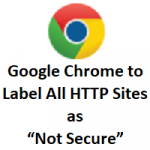 .app TLD is launched, and hackers won't like it
For a long time, we have been covering Google’s crusade against HTTP. Now Google has taken another step closer to what we’ve it’s been aspiring to—HTTPS Everywhere. Google has just launched .app, its newest TLD from Google Registry. This TLD has been designed specifically for apps and app developers. .app comes with a distinct advantage, and that advantage is HTTPS by default—HSTS in other words.
We’ll get to HSTS in a minute but Continue Reading
.app TLD is launched, and hackers won't like it
For a long time, we have been covering Google’s crusade against HTTP. Now Google has taken another step closer to what we’ve it’s been aspiring to—HTTPS Everywhere. Google has just launched .app, its newest TLD from Google Registry. This TLD has been designed specifically for apps and app developers. .app comes with a distinct advantage, and that advantage is HTTPS by default—HSTS in other words.
We’ll get to HSTS in a minute but Continue Reading
Search results for how to install
Google Launches .app Top-Level Domain with HSTS as a Default
 .app TLD is launched, and hackers won't like it
For a long time, we have been covering Google’s crusade against HTTP. Now Google has taken another step closer to what we’ve it’s been aspiring to—HTTPS Everywhere. Google has just launched .app, its newest TLD from Google Registry. This TLD has been designed specifically for apps and app developers. .app comes with a distinct advantage, and that advantage is HTTPS by default—HSTS in other words.
We’ll get to HSTS in a minute but Continue Reading
.app TLD is launched, and hackers won't like it
For a long time, we have been covering Google’s crusade against HTTP. Now Google has taken another step closer to what we’ve it’s been aspiring to—HTTPS Everywhere. Google has just launched .app, its newest TLD from Google Registry. This TLD has been designed specifically for apps and app developers. .app comes with a distinct advantage, and that advantage is HTTPS by default—HSTS in other words.
We’ll get to HSTS in a minute but Continue Reading
What is SSL/TLS Client Authentication? How does it work?
 Did you know that SSL can be installed on your PC? Here's everything you need to know
Secure Sockets Layer (SSL) is a PKI protocol to authenticate the user’s identity and encrypt the communication between the client and the server. An SSL certificate ensures that nobody can intercept, read, or change the conversation between the client and the server.
You know about SSL/TLS certificates. You know that they’re pretty damn important. And you also know that they're installed on servers. But what Continue Reading
Did you know that SSL can be installed on your PC? Here's everything you need to know
Secure Sockets Layer (SSL) is a PKI protocol to authenticate the user’s identity and encrypt the communication between the client and the server. An SSL certificate ensures that nobody can intercept, read, or change the conversation between the client and the server.
You know about SSL/TLS certificates. You know that they’re pretty damn important. And you also know that they're installed on servers. But what Continue Reading
What is S/MIME? How does it work? Do I need S/MIME?
 Here's everything you need to know about S/MIME certificates
S/MIME, the acronym of Secure/Multipurpose Internet Mail Extensions, is a universal web standard defined by the IETF. S/MIME is employed to encrypt MIME data—emails in simple terms. Initially developed by RSA Data Security, it's been made a standard by the IETF and has been defined in many of its documents.
S/MIME, based on Public Key Infrastructure or Asymmetric Encryption, facilitates email security by virtue of encryption, authentication, Continue Reading
Here's everything you need to know about S/MIME certificates
S/MIME, the acronym of Secure/Multipurpose Internet Mail Extensions, is a universal web standard defined by the IETF. S/MIME is employed to encrypt MIME data—emails in simple terms. Initially developed by RSA Data Security, it's been made a standard by the IETF and has been defined in many of its documents.
S/MIME, based on Public Key Infrastructure or Asymmetric Encryption, facilitates email security by virtue of encryption, authentication, Continue Reading
81% of Federal Government Websites Have Implemented HTTPS
 3 Years After the Obama Administration Directive, 19% of the Websites are Yet to Comply
On June 8, 2015 the White House Office of Management and Budget (OMB) issued the HTTPS-Only Standard directive, which required that all publicly accessible Federal government websites and services must be served via secure HTTPS connection.
Unencrypted HTTP connections create a vulnerability and expose potentially sensitive information about users of unencrypted Federal websites and services. This data Continue Reading
3 Years After the Obama Administration Directive, 19% of the Websites are Yet to Comply
On June 8, 2015 the White House Office of Management and Budget (OMB) issued the HTTPS-Only Standard directive, which required that all publicly accessible Federal government websites and services must be served via secure HTTPS connection.
Unencrypted HTTP connections create a vulnerability and expose potentially sensitive information about users of unencrypted Federal websites and services. This data Continue Reading
Want to Enhance Customer Experience on your Website? Make Them Feel Secure
 Customer Vigilance is Touching New Heights and So Should your Website Security
Do you know what the best physical businesses do to facilitate the best customer experience? They make their customers feel happy. Now you might be inclined to think that this is a pretty simplistic answer, but don’t you dare think this way. Customer Experience is a much more complicated field than most of us imagine.
You might be surprised to know that many leading universities have dedicated programs in this Continue Reading
Customer Vigilance is Touching New Heights and So Should your Website Security
Do you know what the best physical businesses do to facilitate the best customer experience? They make their customers feel happy. Now you might be inclined to think that this is a pretty simplistic answer, but don’t you dare think this way. Customer Experience is a much more complicated field than most of us imagine.
You might be surprised to know that many leading universities have dedicated programs in this Continue Reading
Announcement: 3-Year SSL Certificates to be Terminated from March 1, 2018
 Maximum lifespan of SSL certificates to shortened to 2 years
Beginning March 1, 2018, you will no longer be able to buy 3-year SSL certificates. This change, passed by the CA/Browser forum last year, is set to become a reality in the upcoming days. As a consequence, all the certificates will come with the maximum lifecycle of 2 years. This 2-year period will also include an additional period for website admins to renew their certs, taking the total lifespan to 825 days.
Note that this change Continue Reading
Maximum lifespan of SSL certificates to shortened to 2 years
Beginning March 1, 2018, you will no longer be able to buy 3-year SSL certificates. This change, passed by the CA/Browser forum last year, is set to become a reality in the upcoming days. As a consequence, all the certificates will come with the maximum lifecycle of 2 years. This 2-year period will also include an additional period for website admins to renew their certs, taking the total lifespan to 825 days.
Note that this change Continue Reading
Browser Watch: Google Chrome to Label All HTTP Sites as “Not Secure”
 Brace yourself HTTP site owners, Chrome’s “Not Secure” warnings are coming
Browsing on Google Chrome has gotten a whole lot more secure lately, and it's about to add another layer of security. That’s because Google will soon mark all HTTP pages as "Not Secure." It means that all websites without an SSL certificate will be subjected to Google's warnings. This is a significant move from a security point of view, and many security professionals have welcomed it with open arms.
The news Continue Reading
Brace yourself HTTP site owners, Chrome’s “Not Secure” warnings are coming
Browsing on Google Chrome has gotten a whole lot more secure lately, and it's about to add another layer of security. That’s because Google will soon mark all HTTP pages as "Not Secure." It means that all websites without an SSL certificate will be subjected to Google's warnings. This is a significant move from a security point of view, and many security professionals have welcomed it with open arms.
The news Continue Reading
SSL Certificate Benefits – How Comodo SSL Helps to Secure Your Site
 Understand why SSL Certificate is an indispensable part of web security
Gone are the days when SSL certificates were considered to be a luxury. In today’s age where hackers are always lurking, and users are more vigilant than ever, securing a website using an SSL/TLS certificate is nothing but a norm that everyone has to follow. If you have a website, you have an SSL – it’s as simple as that! This is because an SSL certificate accomplishes two of the most significant requirements from the Continue Reading
Understand why SSL Certificate is an indispensable part of web security
Gone are the days when SSL certificates were considered to be a luxury. In today’s age where hackers are always lurking, and users are more vigilant than ever, securing a website using an SSL/TLS certificate is nothing but a norm that everyone has to follow. If you have a website, you have an SSL – it’s as simple as that! This is because an SSL certificate accomplishes two of the most significant requirements from the Continue Reading
Importance of Identity Verification While Purchasing an SSL Certificate
 Understand why validation is a necessary and indispensable part of SSL security
If you have even slightest idea about TLS/SSL certificates, you’d know that there’s a thing called ‘Identity verification’ or the ‘verification process’. Basically, it’s a process that’s used to validate the identity of the certificate’s recipient. In simpler words, it’s done to make sure that the person/organization wanting to have the certificate issued is real and trustworthy. Whether it’s the Continue Reading
Understand why validation is a necessary and indispensable part of SSL security
If you have even slightest idea about TLS/SSL certificates, you’d know that there’s a thing called ‘Identity verification’ or the ‘verification process’. Basically, it’s a process that’s used to validate the identity of the certificate’s recipient. In simpler words, it’s done to make sure that the person/organization wanting to have the certificate issued is real and trustworthy. Whether it’s the Continue Reading
How do SSL Certificates work?
 A brief description of what SSL is, what it does and how it works
You may have heard you need an SSL certificate, but you might not be sure what it is or what it does. No problem. We’re here to help you.
An SSL certificate accomplishes two things.
Encryption: It enables an encrypted connection between a client (web browser) and a web server (website). It protects the communication between individuals and websites. Without this, the entire Continue Reading
A brief description of what SSL is, what it does and how it works
You may have heard you need an SSL certificate, but you might not be sure what it is or what it does. No problem. We’re here to help you.
An SSL certificate accomplishes two things.
Encryption: It enables an encrypted connection between a client (web browser) and a web server (website). It protects the communication between individuals and websites. Without this, the entire Continue Reading

